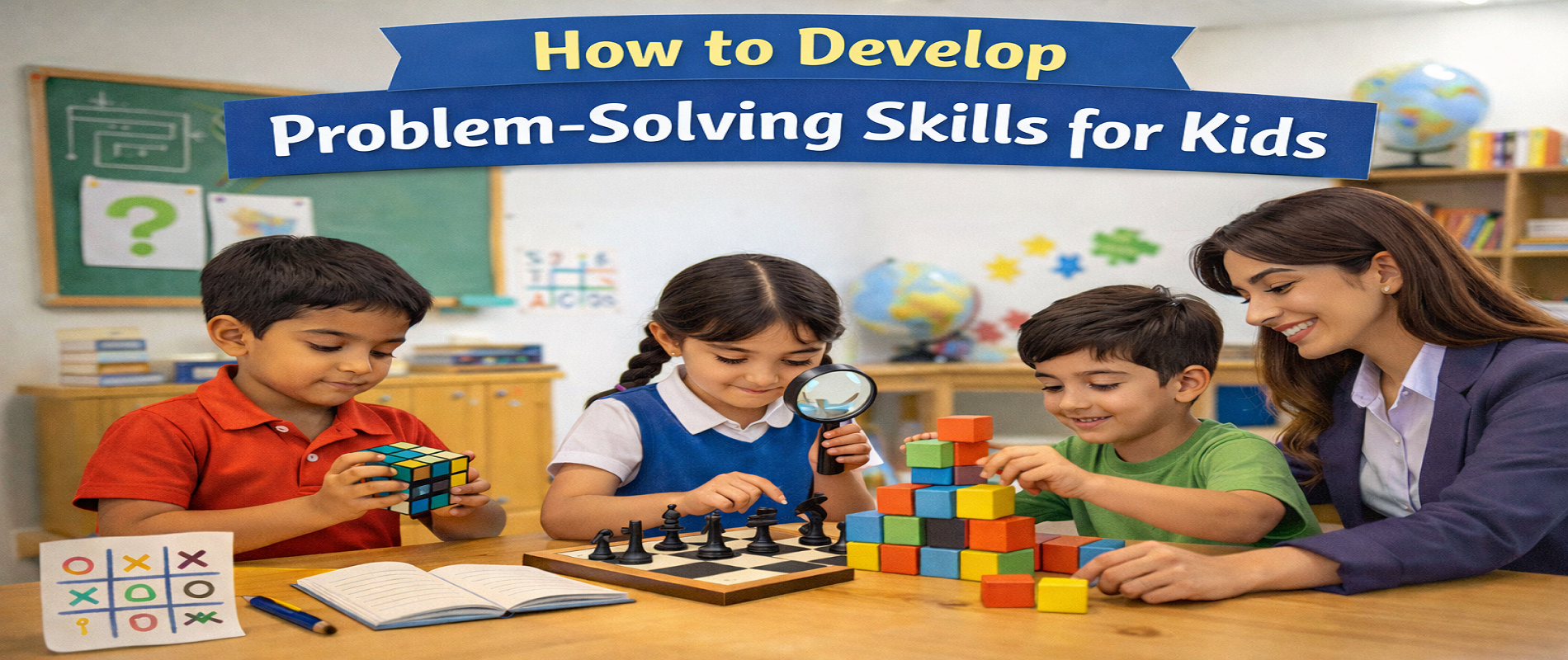Juggling schoolwork, extracurricular activities, exams, and social life can be a demanding feat for students. In the whirlwind of deadlines, projects, and peer pressure, it’s easy to neglect your own well-being. But here’s the secret: prioritizing self-care isn’t selfish, it’s essential! Just like a plant needs water and sunlight to thrive, you need to take care of yourself mentally and physically to reach your full potential.
At Gyan Vihar World School, a leading CBSE school in Jaipur, we understand the pressures students face. We go beyond academics and believe in nurturing the whole student. This includes fostering a culture of self-care and empowering students to prioritize their well-being alongside their academic goals.
What is Self-Care and Why is it Important for Students?
Self-care is the deliberate and proactive practice of taking action to preserve and improve your mental and physical health. It’s not about indulging in luxuries or leisure activities, but rather about making conscious choices to nurture your mind, body, and spirit.
Here’s a deeper dive into why self-care is crucial for students:
- Reduces Stress and Anxiety: School life can be a significant source of stress, from exams and projects to peer pressure and social anxieties. Self-care practices like meditation, exercise, and spending time in nature can effectively combat these anxieties and promote relaxation. Here’s how self-care helps manage stress:
- Stress Management Techniques: Self-care activities like mindfulness meditation, deep breathing exercises, and progressive muscle relaxation equip students with tools to manage stress healthily. These techniques help regulate the nervous system’s response to stress, promoting a sense of calm and well-being.
- Improves Sleep Quality: Chronic stress can disrupt sleep patterns, leading to fatigue and difficulty concentrating. Self-care practices like establishing a relaxing bedtime routine and limiting screen time before bed can significantly improve sleep quality. This, in turn, reduces stress levels and enhances overall well-being.
- Promotes Emotional Regulation: Self-care activities like journaling and creative expression allow students to process their emotions healthily. This emotional regulation helps them manage stress more effectively and prevents negative emotions from spiraling out of control.
- Improves Academic Performance: When you’re well-rested, focused, and feeling good, you’re better equipped to learn and retain information. Self-care can lead to improved academic performance in several ways:
- Enhanced Concentration and Focus: Stress and anxiety can significantly impair concentration. Self-care practices like mindfulness meditation and deep breathing exercises help students focus their attention and improve their ability to concentrate on academic tasks.
- Boosts Memory and Cognitive Function: Adequate sleep, proper nutrition, and regular exercise are all crucial for optimal brain function. Prioritizing self-care ensures your brain has the resources it needs to process information effectively, learn new concepts, and retain knowledge.
- Increased Motivation and Perseverance: When you feel good physically and mentally, you’re more likely to be motivated and engaged in your studies. Self-care helps students approach challenges with a positive attitude and perseverance, leading to greater academic success.
- Boosts Confidence and Self-Esteem: Taking care of yourself sends a powerful message of self-worth and appreciation. Here’s how self-care fosters a positive self-image:
- Focus on Strengths: Self-care practices like journaling and positive affirmations encourage self-reflection and help students identify their strengths and capabilities. This self-awareness fosters a sense of confidence and empowers students to believe in their ability to succeed.
- Healthy Habits, Positive Self-Image: Making healthy choices through self-care demonstrates a commitment to well-being. This fosters a positive self-image and allows students to feel good about themselves, both physically and mentally.
- Stress Management and Emotional Regulation: Chronic stress and anxiety can chip away at self-esteem. Self-care practices equip students with tools to manage stress and regulate their emotions, leading to a more positive and confident outlook.
- Enhances Emotional Well-being: Self-care practices can help you manage negative emotions like stress, anxiety, and frustration healthily. This emotional regulation allows you to navigate challenges with greater resilience and maintain a positive outlook:
- Reduces Symptoms of Anxiety and Depression: Self-care practices like mindfulness meditation, exercise, and spending time in nature have been shown to effectively reduce symptoms of anxiety and depression in adolescents.
- Develops Healthy Coping Mechanisms: Self-care encourages students to develop healthy coping mechanisms for dealing with stress and negative emotions. This could involve activities like journaling, creative expression, or seeking support from trusted adults.
- Promotes Resilience: Life throws curveballs, and self-care helps students develop the resilience to bounce back from setbacks and challenges. By taking care of their mental and physical health, students are better equipped to handle life’s ups and downs with an optimistic attitude.
- Promotes Healthy Habits: Developing self-care routines early on lays the foundation for lifelong healthy habits. Here’s how self-care can lead to long-term well-being:
- Healthy Lifestyle Choices: Self-care practices encourage healthy habits like nutritious eating, regular exercise, and adequate sleep. These habits become ingrained over time, contributing to overall physical and mental well-being for years to come.
- Preventative Health: Prioritizing self-care can help prevent chronic health conditions like obesity, heart disease, and even mental health issues later in life. By developing healthy habits early on, students set themselves up for a lifetime of well-being.
- Positive Role Model: When students prioritize self-care, they become positive role models for their peers and family members. This can create a ripple effect, promoting healthy habits throughout the community.
Essential Self-Care Practices for Students
Self-care is a personal journey, and what works for one student might not work for another. However, here are some essential self-care practices that can benefit all students:
Physical Health:
- Healthy Eating: Fuel your body with nutritious foods that provide energy and support brain function. Here are some tips for healthy eating:
- Balanced Meals: Aim for a balanced diet that includes plenty of fruits, vegetables, whole grains, and lean protein.
- Limit Processed Foods: Processed foods are often high in sugar, unhealthy fats, and sodium. Limit your intake of sugary drinks, fast food, and processed snacks.
- Stay Hydrated: Drinking plenty of water is essential for overall health and cognitive function. Aim to drink water throughout the day, especially before, during, and after exercise.
- Regular Exercise: Physical activity is a powerful stress reliever and mood booster. Here are some tips to incorporate exercise into your routine:
- Find Activities You Enjoy: The key is to choose activities you find enjoyable, whether it’s team sports, individual workouts, dance classes, or simply going for a brisk walk.
- Aim for at Least 30 Minutes Most Days: The Centers for Disease Control and Prevention (CDC) recommends at least 30 minutes of moderate-intensity exercise most days of the week.
- Start Small and Gradually Increase: If you’re new to exercise, start with short bursts of activity and gradually increase the duration and intensity as your fitness level improves.
- Quality Sleep: Adequate sleep is crucial for both physical and mental health. Here are some tips to promote healthy sleep:
- Establish a Regular Sleep Schedule: Go to bed and wake up at the same time each day, even on weekends. This helps regulate your body’s natural sleep-wake cycle.
- Create a Relaxing Bedtime Routine: Develop a calming bedtime routine that helps you wind down before sleep. This could include taking a warm bath, reading a book, or practicing relaxation techniques like deep breathing or meditation.
- Optimize Your Sleep Environment: Ensure your bedroom is dark, quiet, and cool for optimal sleep. Avoid using electronic devices in bed, as the blue light emitted from screens can interfere with sleep.
Mental and Emotional Well-being:
- Mindfulness Practices: Activities like meditation, deep breathing exercises, and yoga can help reduce stress, improve focus, and promote emotional regulation. Here are some resources to get you started:
- Mindfulness Apps: There are many free and paid mindfulness apps available, offering guided meditations and exercises for beginners. Popular options include Headspace, Calm, and Insight Timer.
- Online Resources: Numerous websites and online resources offer information on mindfulness techniques and practices.
- Yoga Classes: Consider joining a yoga class at a local studio or gym. Yoga combines physical postures, breathing exercises, and meditation, promoting relaxation and stress reduction.
- Spend Time in Nature: Immersing yourself in nature has a calming and restorative effect. Here are some ways to connect with nature:
- Go for a Walk in the Park: Take a break from your studies and enjoy some fresh air and sunshine in a nearby park.
- Spend Time in Your Backyard: Even a few minutes spent in your backyard or on your balcony can be beneficial.
- Plan Outdoor Activities: Plan weekend outings that involve spending time in nature, such as hiking, camping, or gardening.
- Connect with Loved Ones: Nurturing strong social connections is essential for emotional well-being. Here are some ways to stay connected:
- Schedule Regular Time with Friends and Family: Make time for activities you enjoy with loved ones, whether it’s grabbing coffee with a friend, having a family dinner, or playing games together.
- Join a Club or Activity: Joining a club or activity related to your interests is a great way to meet new people and build social connections.
- Stay Connected Virtually: While in-person interaction is ideal, video calls and online messaging can also help you stay connected with loved ones who live far away.
- Express Yourself Creatively: Engage in activities you enjoy, like painting, writing, music, or dance. Creative expression allows you to relax, de-stress, and healthily explore your emotions. Here are some ideas to get your creative juices flowing:
- Pursue Hobbies: Dust off an old hobby or try something new. Whether it’s painting, writing poetry, playing music, or learning a new dance style, creative pursuits offer a healthy outlet for self-expression.
- Journaling: Writing down your thoughts and feelings can be a powerful tool for self-exploration and emotional release. Journaling allows you to process experiences, identify emotions, and gain insights into yourself.
- Art Therapy: Art therapy is a form of therapy that uses creative expression to explore emotions and improve mental health. Consider seeking guidance from a certified art therapist if you’re interested in exploring this approach.
- Seek Help When Needed: Don’t be afraid to reach out for help if you’re struggling with stress, anxiety, or other mental health challenges. Here are some resources available to you:
- School Counselor: Most schools have counselors available to provide support and guidance to students. Don’t hesitate to make an appointment to talk to your school counselor if you’re feeling overwhelmed.
- Therapist: If you need more extensive support, consider seeking help from a licensed therapist. A therapist can provide individual therapy sessions to help you develop coping mechanisms, manage stress, and improve your overall well-being.
- Trusted Adult: Talk to a trusted adult, such as a parent, teacher, or religious leader, if you’re feeling overwhelmed. Talking to someone you trust can provide emotional support and help you connect with resources that can help.
Remember, self-care is a journey, not a destination. Be kind to yourself, celebrate your successes, and don’t get discouraged if you have setbacks.
Self-Care Tips for Busy Students
Finding time for self-care can be challenging when you’re juggling a busy school schedule. Here are some tips to make self-care a manageable and impactful part of your routine:
- Schedule Self-Care: Treat self-care like any other important commitment. Schedule time in your planner for activities like exercise, meditation, or spending time with loved ones. Blocking out dedicated time ensures these activities don’t get pushed aside.
- Start Small: You don’t need to overhaul your entire life overnight. Begin with small, manageable self-care practices that you can easily integrate into your routine. Start with 5 minutes of meditation in the morning or a 15-minute walk during your lunch break. As self-care becomes a habit, you can gradually increase the time or activities involved.
- Multitask When Possible: Combine activities whenever possible to maximize your time. Listen to educational podcasts while exercising, or practice mindfulness techniques while waiting for the bus.
- Set Realistic Goals: Don’t set yourself up for failure by aiming for unrealistic goals. Prioritize a few key self-care practices and focus on consistency rather than quantity.
- Learn to Say No: It’s okay to decline commitments that drain your energy or leave you feeling overwhelmed. Prioritizing your well-being allows you to be more present and engaged in the activities you do choose to participate in.
- Embrace Imperfection: Don’t get discouraged if you miss a scheduled self-care activity or have an off day. The key is to be kind to yourself and get back on track with your self-care routine as soon as possible.
Beyond Self-Care: Building a Support System at Gyan Vihar World School
While self-care practices are essential, it’s important to remember that you don’t have to navigate challenges alone. At Gyan Vihar World School, a Top School in Jaipur and one of the Best CBSE Schools in Jaipur, we go beyond academics and prioritize student well-being. Here’s how we support our students in their self-care journeys:
- Mindfulness and Yoga Sessions: We incorporate mindfulness practices and yoga sessions into our curriculum to help students develop self-awareness, emotional regulation, and stress management skills.
- Positive School Culture: We foster a positive and supportive school environment where students feel comfortable seeking help from teachers, counselors, or peers.
Investing in Yourself – The Key to Success
By prioritizing self-care, you’re investing in your most valuable asset – yourself. When you take care of your mental and physical health, you’re better equipped to handle academic challenges, navigate social pressures, and achieve your full potential. Remember, self-care is not a luxury, it’s a necessity for a happy, healthy, and successful school life.
Gyan Vihar World School, a leading CBSE school in Jaipur, is committed to empowering students to become well-rounded individuals. We believe that academic excellence goes hand-in-hand with emotional well-being. By incorporating self-care practices and fostering a supportive school environment, we equip our students with the tools and resources they need to thrive not only academically but also personally.
Take the first step towards a happier and healthier you – prioritize self-care today!







